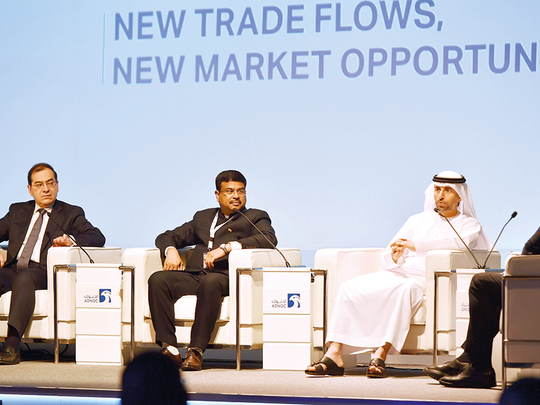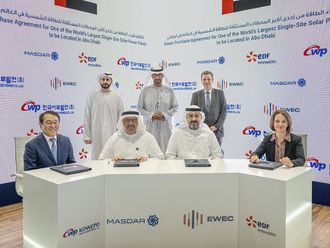
Abu Dhabi: The Organisation of Petroleum Exporting Countries (Opec) and non-Opec members are working towards market stability and are not aiming for certain prices, UAE Energy Minister Suhail Al Mazroui said on Sunday.
“The objective of Opec and non-Opec members is to reach market stability, to have [the] market stabilised at an inventory levels which are healthy for producers and healthy for consumers. We are not aiming for a certain price,” said Al Mazroui while speaking at Downstream Investment Forum in Abu Dhabi.
The comments come amid rising oil prices over the last few weeks due to various factors including geopolitics, a draw-down in global oil inventories, and healthy demand. The decision of US President Donald Trump to withdraw from Iran nuclear deal also helped oil prices move further upward.
Brent, the global benchmark, is currently trading above $77 (Dh282.82) per barrel with West Texas Intermediate above $70 per barrel.
“Everyone thought that when oil prices go north of $60 per barrel, compliance will not be there but there is a good percentage of conformity to the deal.”
He also said that he is worried about the level of investments in the energy sector in the next two years.
“If we do not have enough investments we will have a problem down the road. Gulf countries companies including Adnoc, Saudi Aramco and Kuwait Petroleum Corporation are investing to maintain balance in oil.”
Speaking to reporters after the forum, he said in the next Opec meeting, they would be discussing about the right level of inventories and how to put the group (both Opec, non-Opec members) together longer.
“We now have a larger number of countries including both Opec and non-Opec. We have seen declines in many countries; for example, in Venezuela the decline is large.”
When asked whether there will be supply issues arising out of Trump’s decision to exit the Iran nuclear deal, he said the supply would be managed.
“Don’t worry about supply. We managed to solve the supply issue but we still believe that we have the buffer. We will meet in July to discuss.”
UAE sees Opec oil capacity ‘buffer’ offsetting Iran curbs
The Organisation of Petroleum Exporting Countries (Opec) has enough spare production capacity to cushion oil markets if the US re-imposes sanctions on Iran, according to UAE Energy Minister Suhail Al Mazroui.
Three members of Opec — Saudi Arabia, Kuwait and the UAE — together have enough capacity, Al Mazroui said in an interview with Bloomberg Television in Abu Dhabi. He serves this year as Opec’s president.
“Don’t worry about supply,” Al Mazroui told reporters later in Abu Dhabi. “I don’t think there will be issues as a result of sanctions.”
Opec has an adequate “buffer” of potential output, he said.












